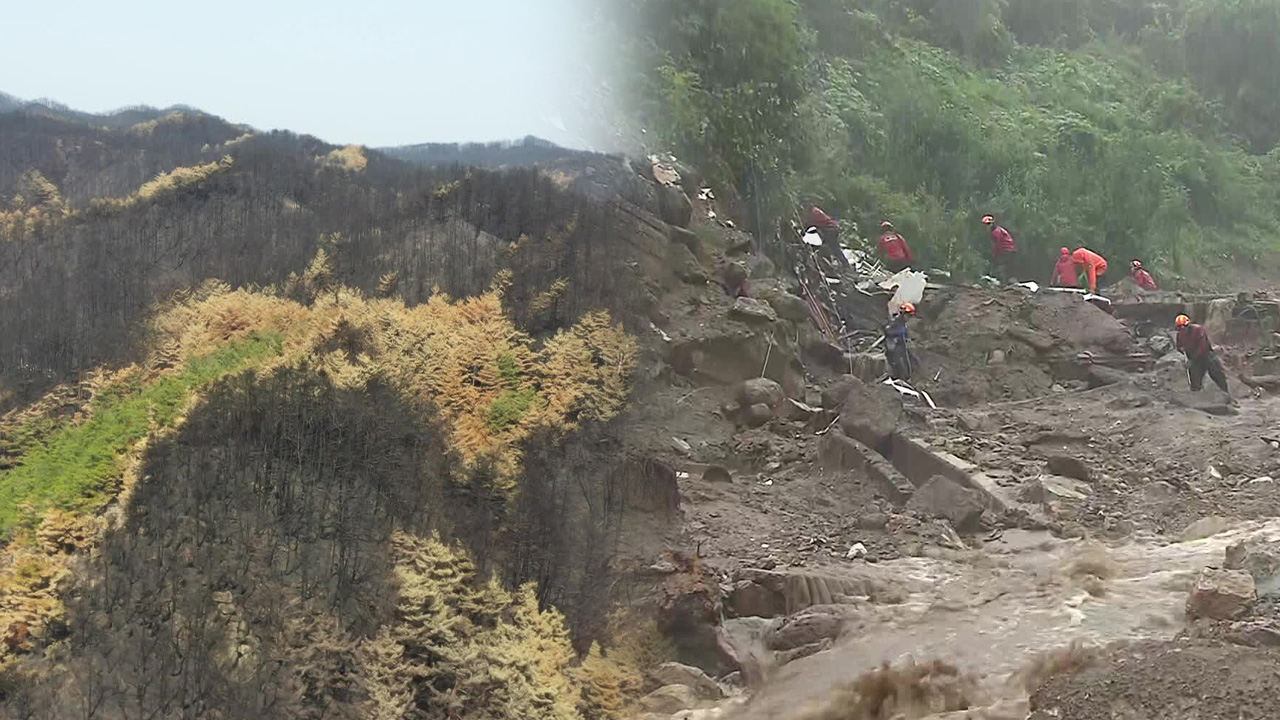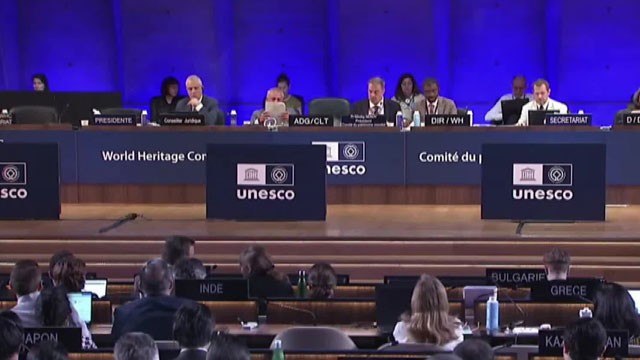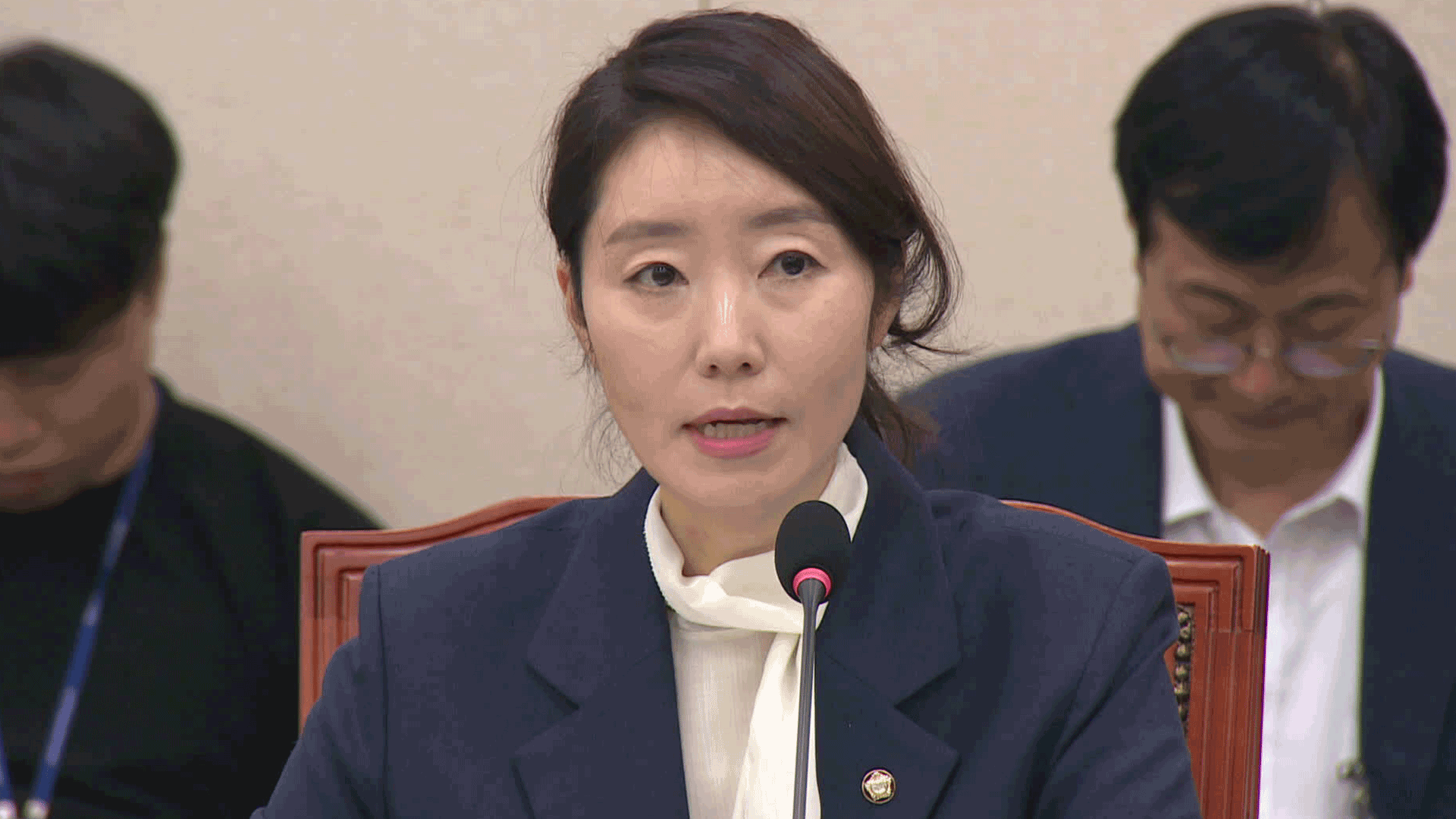[Anchor]
Amid forecasts of strong winds and rain, no region is more on edge than those recently hit by wildfires.
With most trees now gone, concerns are growing over potential landslides.
The only option appears to be predicting and evacuating early—but now, there's word of new technology that could help secure a critical evacuation window.
This is Kang Pu-reun.
[Report]
[Oh! Oh! Oh!]
The 2011 Umyeonsan landslide, which resulted in 16 fatalities, caused significant casualties due to sudden heavy rain without any time to escape.
Since then, establishing an accurate prediction system to assist in rapid evacuation has become an urgent task.
However, our research team has developed a technology that can predict landslide risks within two and a half hours.
[Kim Min-seok/Director of Landslide Research Center, Korea Institute of Geoscience and Mineral Resources: "This can be seen as a technology that secures the golden time (preparation time) before a landslide occurs."]
The core of the system is ultra-short-term forecast data from the Korea Meteorological Administration, which predicts rainfall within 48 hours.
Based on this, the risk of landslides across the country is calculated within two and a half hours.
This system is particularly effective in mitigating damage from debris flows—mud and rocks swept down by rain that can engulf homes.
Unlike existing prediction methods based on past statistics, this technology analyzes data in real-time, further enhancing the accuracy of predictions.
In fact, when applied to a 2023 landslide in Yecheon, North Gyeongsang Province, the prediction accuracy reached about 90%.
[Lee Seung-jun/Landslide Research Center, Korea Institute of Geoscience and Mineral Resources: "Whereas traditional statistical methods infer future events based on past occurrences, this physics-based algorithm can be fully utilized as long as we have the data."]
The research team expects that this achievement will greatly help in establishing a disaster response foundation for potential landslides that may occur after large wildfires.
This is KBS News, Kang Pu-reun.
Amid forecasts of strong winds and rain, no region is more on edge than those recently hit by wildfires.
With most trees now gone, concerns are growing over potential landslides.
The only option appears to be predicting and evacuating early—but now, there's word of new technology that could help secure a critical evacuation window.
This is Kang Pu-reun.
[Report]
[Oh! Oh! Oh!]
The 2011 Umyeonsan landslide, which resulted in 16 fatalities, caused significant casualties due to sudden heavy rain without any time to escape.
Since then, establishing an accurate prediction system to assist in rapid evacuation has become an urgent task.
However, our research team has developed a technology that can predict landslide risks within two and a half hours.
[Kim Min-seok/Director of Landslide Research Center, Korea Institute of Geoscience and Mineral Resources: "This can be seen as a technology that secures the golden time (preparation time) before a landslide occurs."]
The core of the system is ultra-short-term forecast data from the Korea Meteorological Administration, which predicts rainfall within 48 hours.
Based on this, the risk of landslides across the country is calculated within two and a half hours.
This system is particularly effective in mitigating damage from debris flows—mud and rocks swept down by rain that can engulf homes.
Unlike existing prediction methods based on past statistics, this technology analyzes data in real-time, further enhancing the accuracy of predictions.
In fact, when applied to a 2023 landslide in Yecheon, North Gyeongsang Province, the prediction accuracy reached about 90%.
[Lee Seung-jun/Landslide Research Center, Korea Institute of Geoscience and Mineral Resources: "Whereas traditional statistical methods infer future events based on past occurrences, this physics-based algorithm can be fully utilized as long as we have the data."]
The research team expects that this achievement will greatly help in establishing a disaster response foundation for potential landslides that may occur after large wildfires.
This is KBS News, Kang Pu-reun.
■ 제보하기
▷ 카카오톡 : 'KBS제보' 검색, 채널 추가
▷ 전화 : 02-781-1234, 4444
▷ 이메일 : kbs1234@kbs.co.kr
▷ 유튜브, 네이버, 카카오에서도 KBS뉴스를 구독해주세요!
- New tech predicts landslides early
-
- 입력 2025-04-14 00:43:06

[Anchor]
Amid forecasts of strong winds and rain, no region is more on edge than those recently hit by wildfires.
With most trees now gone, concerns are growing over potential landslides.
The only option appears to be predicting and evacuating early—but now, there's word of new technology that could help secure a critical evacuation window.
This is Kang Pu-reun.
[Report]
[Oh! Oh! Oh!]
The 2011 Umyeonsan landslide, which resulted in 16 fatalities, caused significant casualties due to sudden heavy rain without any time to escape.
Since then, establishing an accurate prediction system to assist in rapid evacuation has become an urgent task.
However, our research team has developed a technology that can predict landslide risks within two and a half hours.
[Kim Min-seok/Director of Landslide Research Center, Korea Institute of Geoscience and Mineral Resources: "This can be seen as a technology that secures the golden time (preparation time) before a landslide occurs."]
The core of the system is ultra-short-term forecast data from the Korea Meteorological Administration, which predicts rainfall within 48 hours.
Based on this, the risk of landslides across the country is calculated within two and a half hours.
This system is particularly effective in mitigating damage from debris flows—mud and rocks swept down by rain that can engulf homes.
Unlike existing prediction methods based on past statistics, this technology analyzes data in real-time, further enhancing the accuracy of predictions.
In fact, when applied to a 2023 landslide in Yecheon, North Gyeongsang Province, the prediction accuracy reached about 90%.
[Lee Seung-jun/Landslide Research Center, Korea Institute of Geoscience and Mineral Resources: "Whereas traditional statistical methods infer future events based on past occurrences, this physics-based algorithm can be fully utilized as long as we have the data."]
The research team expects that this achievement will greatly help in establishing a disaster response foundation for potential landslides that may occur after large wildfires.
This is KBS News, Kang Pu-reun.
Amid forecasts of strong winds and rain, no region is more on edge than those recently hit by wildfires.
With most trees now gone, concerns are growing over potential landslides.
The only option appears to be predicting and evacuating early—but now, there's word of new technology that could help secure a critical evacuation window.
This is Kang Pu-reun.
[Report]
[Oh! Oh! Oh!]
The 2011 Umyeonsan landslide, which resulted in 16 fatalities, caused significant casualties due to sudden heavy rain without any time to escape.
Since then, establishing an accurate prediction system to assist in rapid evacuation has become an urgent task.
However, our research team has developed a technology that can predict landslide risks within two and a half hours.
[Kim Min-seok/Director of Landslide Research Center, Korea Institute of Geoscience and Mineral Resources: "This can be seen as a technology that secures the golden time (preparation time) before a landslide occurs."]
The core of the system is ultra-short-term forecast data from the Korea Meteorological Administration, which predicts rainfall within 48 hours.
Based on this, the risk of landslides across the country is calculated within two and a half hours.
This system is particularly effective in mitigating damage from debris flows—mud and rocks swept down by rain that can engulf homes.
Unlike existing prediction methods based on past statistics, this technology analyzes data in real-time, further enhancing the accuracy of predictions.
In fact, when applied to a 2023 landslide in Yecheon, North Gyeongsang Province, the prediction accuracy reached about 90%.
[Lee Seung-jun/Landslide Research Center, Korea Institute of Geoscience and Mineral Resources: "Whereas traditional statistical methods infer future events based on past occurrences, this physics-based algorithm can be fully utilized as long as we have the data."]
The research team expects that this achievement will greatly help in establishing a disaster response foundation for potential landslides that may occur after large wildfires.
This is KBS News, Kang Pu-reun.
이 기사가 좋으셨다면
-
좋아요
0
-
응원해요
0
-
후속 원해요
0
















이 기사에 대한 의견을 남겨주세요.